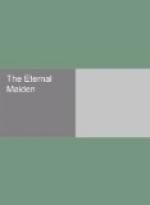“Laugh, friend Maisanguaq,” he said, “for winter comes and then thy teeth will chatter.” Maisanguaq scowled deeply—Ootah’s blithesome remarks filled him with rancor.
“Peace, Maisanguaq. Methinks thou, too, lovest Annadoah,” continued Ootah kindly. “Therefor, I hear thee no spite! For who cannot love Annadoah. Ka—ka! Come—come!” Shaking the water from him, he bade the others tow his kayak to the floe.
Ootah entered his kayak. The struggles of the walrus had subsided, and only two skin floats bobbed feebly on top of the waves. The hunters now strung series of kayaks together with strong leather ropes, three skin boats being attached in a catamaran. Taking up the leather floats one by one, to the rear kayak of each series the hunters fastened the harpoon lines which secured the prey. Thus the animals were to be towed slowly ashore.
Altogether eight walrus had been secured; four of these had fallen to the skill of Ootah. Ootah sang for joy. Again he had achieved distinction on the hunt, and so, with all the better chances of success, he believed he might pursue his suit for the hand of Annadoah. With powerful, steady strokes of their paddles the hunters, in their processions of kayaks, towed the walrus through the sea shoreward. They joined unrestrainedly in Ootah’s hunting chant. Only Maisanguaq was silent.
Now and then, unable to restrain his exuberant joy, Ootah sang his love to the clouds, the waves, the winds.
“O winds, O happy winds, speed my message to Annadoah!” he called. “Tell her that I return with the food of the sea! O spirits of the air, breathe to her that Ootah’s heart hungers for her as starving ahmingmah desire green grass in winter time. O happy, happy waters, I return to Annadoah with food and fuel for winter—say Ootah meuilacto—would wed—Annadoah. Tell her Ootah calls her Mamacadosa!”
The others, although disappointed in being outwon, in spontaneous recognition of his superior feat, chimed a chorus of congratulations. Suddenly Maisanguaq gleefully pointed a significant finger to the sky.
“Pst!” he said.
A black guillemot, like an omen of evil, passed over Ootah’s head.
By all the immemorial customs of their people, because of the established pre-eminence of his prowess, Ootah should now find favor in the eyes of Annadoah. Scarce seventeen summers had passed over Annadoah’s head and of wooers she had a score. The young hunters, not only of her own tribe, but of others far south, sought her hand. The fame of her beauty and skill had travelled far. None, it was said, equalled her dexterity in plaiting sinew thread; none cut and sewed garments as this maid with tender child’s hands. She made weapons, she brewed marvellous broths. Since the death of her mother she had served the tribe with her skill. Yet, as the summers passed, she remained carefree




